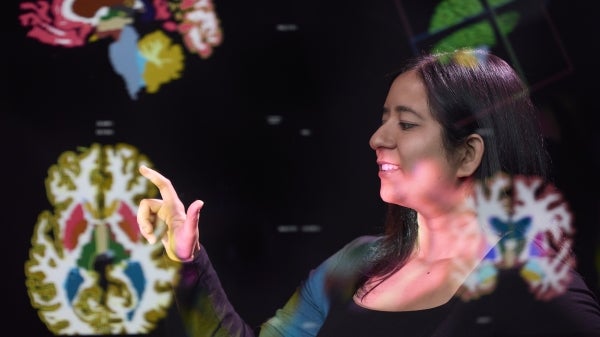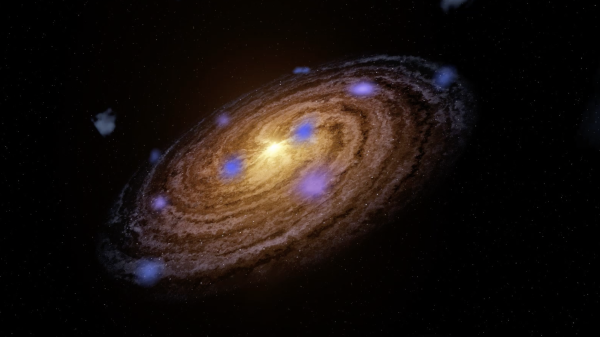Sun Devil Alka Rocketeers to compete in 2019 Bayer Alka-Rocket Challenge

Members of the Sun Devil Alka Rocketeers after a successful test launch at Esteban Park in Tempe. Left to right: Jacob Abraham, Jared Lee-Kin, Rushal Butala, Joshua Pardhe, Joriel Cura and Gray Harris. Photo courtesy of Sun Devil Alka Rocketeers
Practically everyone knows that Alka Seltzer tablets mixed with water are a go-to effervescent remedy for indigestion.
But did you know that a mixture of Alka Seltzer tablets and water in an enclosed cylinder can produce enough pressure to launch a rocket?
Several Arizona State University students, calling themselves the Sun Devil Alka Rocketeers, know it and are using their skills in engineering and design — and yes, their knowledge of the benefits and power of Alka Seltzer — to compete in the national 2019 Bayer Alka-Rocket Challenge. The competition pits teams from four-year accredited universities throughout the country against each other to see who can design, build and launch a rocket powered by Alka Seltzer tablets and water the highest.
Joshua Pardhe, a Barrett, The Honors College sophomore and president of the Alka Rocketeers, founded the organization last year with three members (all engineering majors) and pushed for official student organization designation and funding through the Ira A. Fulton Schools of Engineering at ASU. The Alka Rocketeers is now an official student organization within the Fulton Schools and has 18 members with a mix of majors, including engineering, business and liberal arts. Most members are Barrett, The Honors College students.
Last year, the Alka Rocketeers was the first-ever team from ASU to compete in the Bayer Alka-Rocket Challenge. Their rocket was made out of PVC piping, a pressure chamber, a removable launch tube and a 3D printed rocket with an altimeter inside.
This year, the group has perfected its design and built a launcher out of pressure-rated PVC piping and brass valves and a rocket that was custom-designed out of ABS plastic and 3D printed at the Fulton Computing, Informatics, and Decision Systems Engineering Print Lab. They hope to launch their rocket at least 200 feet for the Alka-Rocket Challenge. In testing, the rocket reached 154 feet.
Participants in the Alka-Rocket Challenge go through two rounds of competition that run concurrently. One round requires participants to submit a video and a document explaining how they built their Alka-Rocket, any challenges they faced and how they responded, and showing their rocket in action. A professional panel of judges chooses four finalists, each one representing a census region of the United States.
WATCH: View the Sun Devil Alka Rocketeers’ video on YouTube.
The other round of competition involves a public voting period where a photo of each participating team is posted on Facebook and each “like” on the photo counts as a vote for that team. The team with the most “likes” will become the fifth finalist.
VOTE: Vote for the team photo. The public voting period ends Nov. 15.
The five finalist teams, which will be announced Nov. 18, will win a trip for four team members to the Kennedy Space Center in Florida to compete with other teams to see whose rocket can fly highest.
The official competition launch will take place Dec. 12. The team that breaks the existing highest-flying Alka-Rocket record wins a Guinness World Record title and $5,000. The team that launches its rocket the highest and recovers it wins $25,000. The team that achieves both feats wins $30,000.
The Alka Rocketeers are hosting several events to promote their project and ask for votes:
• Rocketpalooza, ASU’s first-ever rocketry expo with music, food, and games, will be held 6 to 8 p.m., Nov. 8, at the Sun Devil Fitness Center on the ASU Tempe campus.
Rocketpalooza will feature volleyball and dodgeball tournaments, with the winning teams entered into a raffle for an Airpod giveaway. Students interested in participating can register at http://bit.ly/Rocketpalooza2019Volleyball or check in at the event and be assigned to a team. The Alka Rocketeers’ rocket will be on display and launched several times throughout the event. Alka Rocketeers will be available to share information about their organization and how others can join the group.
• Puppies and Propulsion, an event where students can pet puppies and learn about the Alka Rocketeers and its rocket, will be held 2 to 4 p.m., Nov. 12 in Palm Court, located at the main entrance of Barrett, The Honors College’s Tempe complex.
More Science and technology

Podcast explores the future in a rapidly evolving world
What will it mean to be human in the future? Who owns data and who owns us? Can machines think?These are some of the questions…

New NIH-funded program will train ASU students for the future of AI-powered medicine
The medical sector is increasingly exploring the use of artificial intelligence, or AI, to make health care more affordable and…

Cosmic clues: Metal-poor regions unveil potential method for galaxy growth
For decades, astronomers have analyzed data from space and ground telescopes to learn more about galaxies in the universe.…